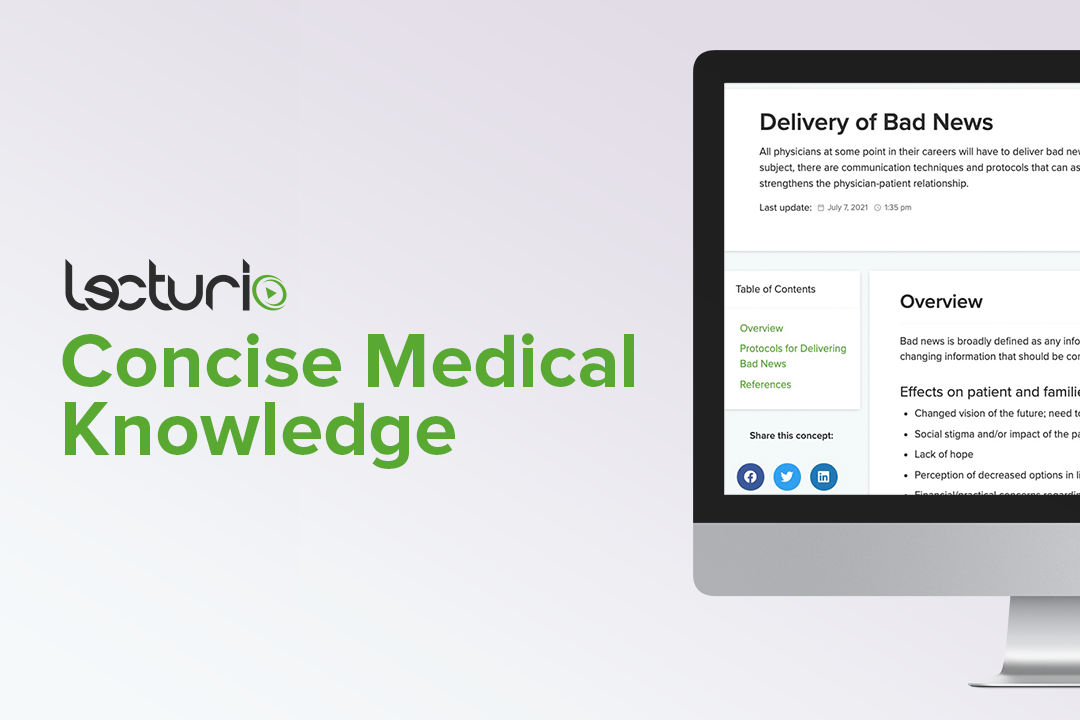Playlist
Show Playlist
Hide Playlist
Knowledge and Information – How to Break News
-
Slides Knowledge and Information How to Break News.pdf
-
Download Lecture Overview
00:00 And then there's the K in SPIKES, knowledge. 00:05 So actually giving the information to the patient. 00:08 Because these are often going to be emotionally laden, it's best that you give a warning shot. 00:14 So the way that you convey the news is going to help prepare them for what you're going to tell them. 00:21 So that when warning shot is something like, "Unfortunately, I've got some bad news to tell you, or I'm sorry to tell you that..." and then you give the news. 00:32 So, some opening sentence that says here, you know, here's something coming. 00:37 You have to prepare yourself for the shock. 00:39 And then I'm going to give you the news. 00:44 So, the information, the knowledge that you give should be at the patient's level of understanding. 00:50 Again, you should not rely on the medical jargon. 00:52 You should try to use basic language that the patient can appreciate. 00:57 It's best to do it in a headline. So, if you think about a newspaper, how they put the top headline, and then they have the text under it, you give the headline as the first amount of information. 01:11 So, after you've given the warning shot, it's a succinct summary, focused on the bottom line of what the news is. 01:18 So, I'm sorry to tell you that you have cancer. 01:21 And then the best thing to do at that point is just to stop, pause, be silent. And let that news sink in. 01:29 Again, it's best to avoid any kind of medical jargon, technical terms, euphemisms. 01:35 Try to be as clear as possible in that headline. 01:41 It's also important that you avoid excessive bluntness. 01:43 So even though you want it to keep it short and straightforward, you don't want it to be blunt. 01:50 If it's too harsh, the patient may blame the messenger. 01:55 So for instance, you're meeting a loved one, in an emergency room, their family member has died. 02:03 The patient has died in a car accident. 02:05 You know, just saying your family members dead. 02:10 You're too blunt, and they haven't gotten any time to sort of prepare for that news. 02:16 Or you're talking to a patient that's been in a car accident, and now they're going to be paralyzed. 02:21 So, you know, saying you're never going to function normally again. 02:25 If that's too blunt of saying it that way, you really got to ease into it. 02:30 Make sure it's clear what the information is, but not so blunt, that the patient gets upset just from the news itself. 02:36 As I've talked about giving information in small chunks, so even though there might be pieces of information. 02:41 So it's a cancer that might have spread to another area. 02:48 It's best to start just with, you have cancer, and then give the other information about metastasis in a second chunk, second chunk after the fact after the patient's had a reaction to the initial part of the information. 03:04 I think it when we're talking about active listening, being silent after you've given the news, waiting for the patient's response, that's the best strategy. 03:13 Waiting for them to say something given emotional reaction. 03:17 That's what you need to do is just however long that is giving that pause after you give him the headline.
About the Lecture
The lecture Knowledge and Information – How to Break News by Mark Hughes, MD, MA is from the course Breaking Serious News and Advance Care Planning.
Included Quiz Questions
Which of the following best describes the purpose of a warning shot when giving serious news?
- To help a patient prepare for a shock
- To tell the patient how long they have to live
- To tell family members to leave the room
- To help the patient get their affairs in order
- To explain to the patient how long to pay for a parking spot
Which of the following would be an appropriate way to provide a warning shot?
- "I'm sorry to tell you that..."
- "I hear what you are saying, but..."
- "Do you want to reschedule our meeting?"
- "Tell me how things are going at home."
- "You have something to learn today."
Customer reviews
5,0 of 5 stars
| 5 Stars |
|
5 |
| 4 Stars |
|
0 |
| 3 Stars |
|
0 |
| 2 Stars |
|
0 |
| 1 Star |
|
0 |




